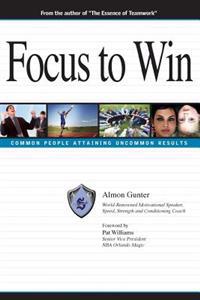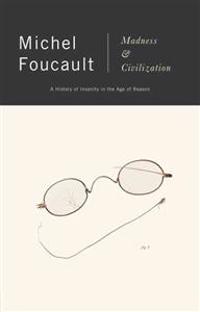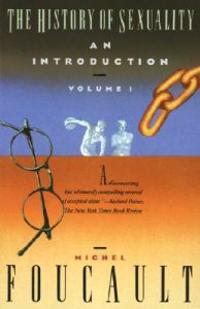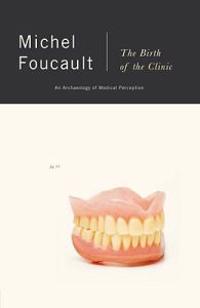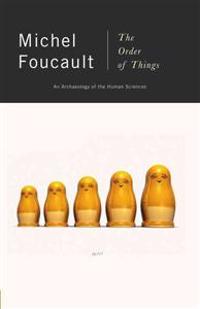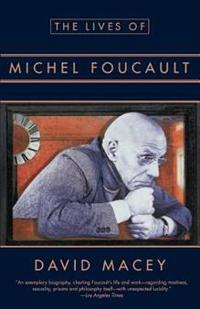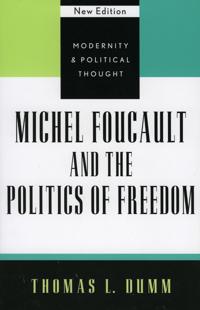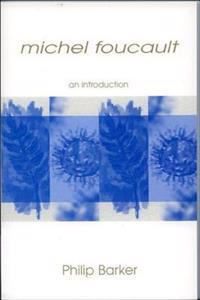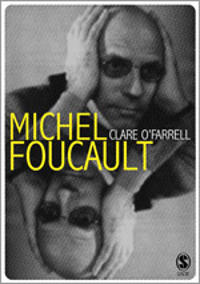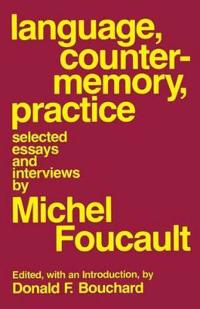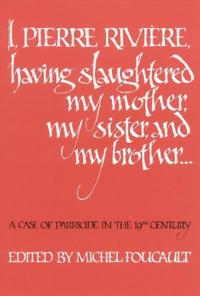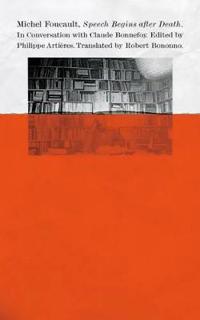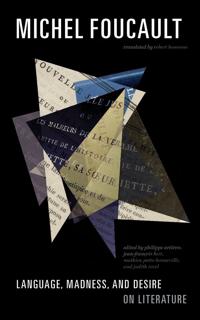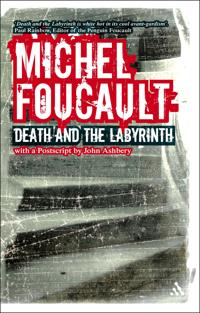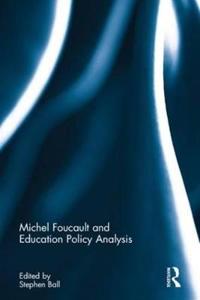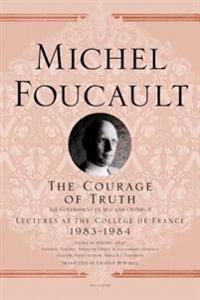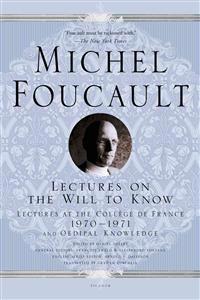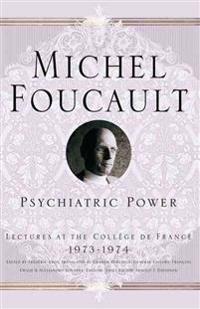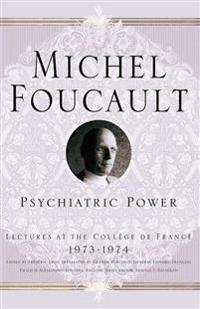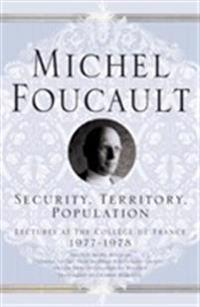The Passion of Michel Foucault (Häftad)
ISBN: 9780674001572 - UTGIVEN: 2000-04Based on extensive new research and a bold interpretation of the man and his texts, "The Passion of Michel Foucault" is a startling look at one of this century's most influential philosophers. It chronicles every stage of Foucault's personal and professional odyssey, from his early interest in dream[...]
Madness and Civilization (Pocket)
avMichel Foucault
ISBN: 9780679721109 - UTGIVEN: 198811Perhaps the French philosopher's masterpiece, which is concerned with an extraordinary question: What does it mean to be mad?[...]
The History of Sexuality (Pocket)
avMichel Foucault
ISBN: 9780679724698 - UTGIVEN: 199004The author turns his attention to sex and the reasons why we are driven constantly to analyze and discuss it. An iconoclastic explanation of modern sexual history.[...]
The Birth of the Clinic: An Archaeology of Medical Perception (Häftad)
avMichel Foucault
ISBN: 9780679753346 - UTGIVEN: 199403In the eighteenth century, medicine underwent a mutation. For the first time, medical knowledge took on a precision that had formerly belonged only to mathematics. The body became something that could be mapped. Disease became subject to new rules of classification. And doctors begin to describe phe[...]
The Order of Things: An Archaeology of Human Sciences (Häftad)
avMichel Foucault
ISBN: 9780679753353 - UTGIVEN: 199403Traces the evolution of man's study of himself from seventeenth-century human sciences
The Lives of Michel Foucault (Pocket)
avDavid Macey
ISBN: 9780679757924 - UTGIVEN: 199505When he died of an AIDS-related condition in 1984, Michel Foucault had become the most influential French philosopher since the end of World War II. His powerful studies of the creation of modern medicine, prisons, psychiatry, and other methods of classification have had a lasting impact on philosop[...]
Michel Foucault (Häftad)
avHubert L. Dreyfus
ISBN: 9780710806550 - UTGIVEN: 1983-09First Published in 1984. Routledge is an imprint of Taylor & Francis, an informa company.
Michel Foucault and the Politics of Freedom (Häftad)
ISBN: 9780742521391 - UTGIVEN: 2002-04What is freedom? In this study, Thomas Dumm challenges the conventions that have governed discussions and debates concerning modern freedom by bringing the work of Michel Foucault into dialogue with contemporary liberal thought. While Foucault has been widely understood to have characterized the mod[...]
Michel Foucault (Häftad)
avPhilip Barker
ISBN: 9780748610389 - UTGIVEN: 199804The ideal guide to Foucault's work for the non-specialist reader. Organised into easy-to-follow thematic sections, it allows the student to explore Foucault's work with no previous knowledge of contemporary theory. It takes the student through the major strands of Foucault's thought on power and k[...]
Michel Foucault (Häftad)
avClare O'Farrell
ISBN: 9780761961642 - UTGIVEN: 200509'Clare O'Farrell is to be congratulated on producing a truly magnificent book on the work of Michel Foucault. There are details, insights and observations that will engage the specialist and there is an extensive documentation of Foucault's output. If there is a more comprehensive book on Foucault'[...]
Language, Counter-Memory, Practice (Häftad)
avMichel Foucault
ISBN: 9780801492044 - UTGIVEN: 198008I, Pierre Riviere, Having Slaughtered My Mother, My Sister, and My Brother: A Case of Parricide in the 19th Century (Häftad)
avMichel Foucault
ISBN: 9780803268579 - UTGIVEN: 198212Language, Madness, and Desire (Inbunden)
avMichel Foucault, Philippe (EDT) Artie`res, Jean-francois (EDT) Bert
ISBN: 9780816693238 - UTGIVEN: 2015-06As a transformative thinker of the twentieth century, whose work spanned all branches of the humanities, Michel Foucault had a complex and profound relationship with literature. And yet this critical aspect of his thought, because it was largely expressed in speeches and interviews, remains virtuall[...]
Death and the Labyrinth (Häftad)
avMichel Foucault
ISBN: 9780826493620 - UTGIVEN: 200611"Death and the Labyrinth" is unique, being Foucault's only work on literature. For Foucault this was "by far the book I wrote most easily and with the greatest pleasure". Here, Foucault explores theory, criticism and psychology through the texts of Raymond Roussel, one of the fathers of experimental[...]
Michel Foucault
ISBN: 9781137351012 - UTGIVEN: 2015-12With special emphasis on Foucault's many recently published lecture series this book provides an updated, comprehensive presentation of his most important diagnoses, his many ground-breaking analytical concepts as well as a systematic account of his unique conception of philosophy.[...]
Michel Foucault and Education Policy Analysis
ISBN: 9781138125735 - UTGIVEN: 2015-12The work of Michel Foucault has become a major resource for educational researchers seeking to understand how education makes us what we are. In this book, a group of contributors explore how Foucault's work is used in a variety of ways to explore the 'hows' and 'whos' of education policy - its tech[...]
Michel Foucault and Education Policy Analysis (häftad)
ISBN: 9781138308916 - UTGIVEN: 2017-11The work of Michel Foucault has become a major resource for educational researchers seeking to understand how education makes us what we are. In this book, a group of contributors explore how Foucault's work is used in a variety of ways to explore the 'hows' and 'whos' of education policy - its tech[...]
Michel foucault
ISBN: 9781138657083 - UTGIVEN: 2017-02This book explores the theoretical contribution of Michel Foucault to the fields of criminology, law, justice and penology. It surveys both the ways in which the work of Foucault has been applied in criminology, but also how his work can be used to understand and explain contemporary issues and poli[...]
The Courage of Truth: The Government of Self and Others II: 1983-1984 (Häftad)
avMichel Foucault, Frederic Gros
ISBN: 9781250009104 - UTGIVEN: 201205"The Courage of the Truth" is the last course that Michel Foucault delivered at the College de France. Here, he continues the theme of the previous year's lectures in exploring the notion of "truth-telling" in politics to establish a number of ethically irreducible conditions based on courage and co[...]
Lectures on the Will to Know (Häftad)
avMichel Foucault
ISBN: 9781250050106 - UTGIVEN: 2015-01"The Will to Know" reminds us that Michel Foucault's work only ever had one object: truth. Here, he builds on his earlier work, "Discipline and Punish," to explore the relationship between tragedy, conflict, and truth-telling. He also explores the different forms of truth-telling, and their relation[...]
Psychiatric Power (Inbunden)
avMichel Foucault
ISBN: 9781403969224 - UTGIVEN: 200604A historical investigation into the practice of psychiatric medicine in the western world chronicles its evolution, offering insight into how diagnoses and treatments changed throughout time and how modern social and political attitudes toward mental illness have developed.[...]
Psychiatric Power (Häftad)
avMichel Foucault
ISBN: 9781403986511 - UTGIVEN: 200808Explores the birth of psychiatry, examining Western society's division of 'mad' and 'sane' and how medicine and law influenced these attitudes.[...]
Security, Territory, Population (Häftad)
avMichel Foucault
ISBN: 9781403986535 - UTGIVEN: 200905Lectures at the Collge de France. 0.
The Birth of Biopolitics (Häftad)
avMichel Foucault
ISBN: 9781403986559 - UTGIVEN: 200810Lectures at the College de France 1978-1979.

